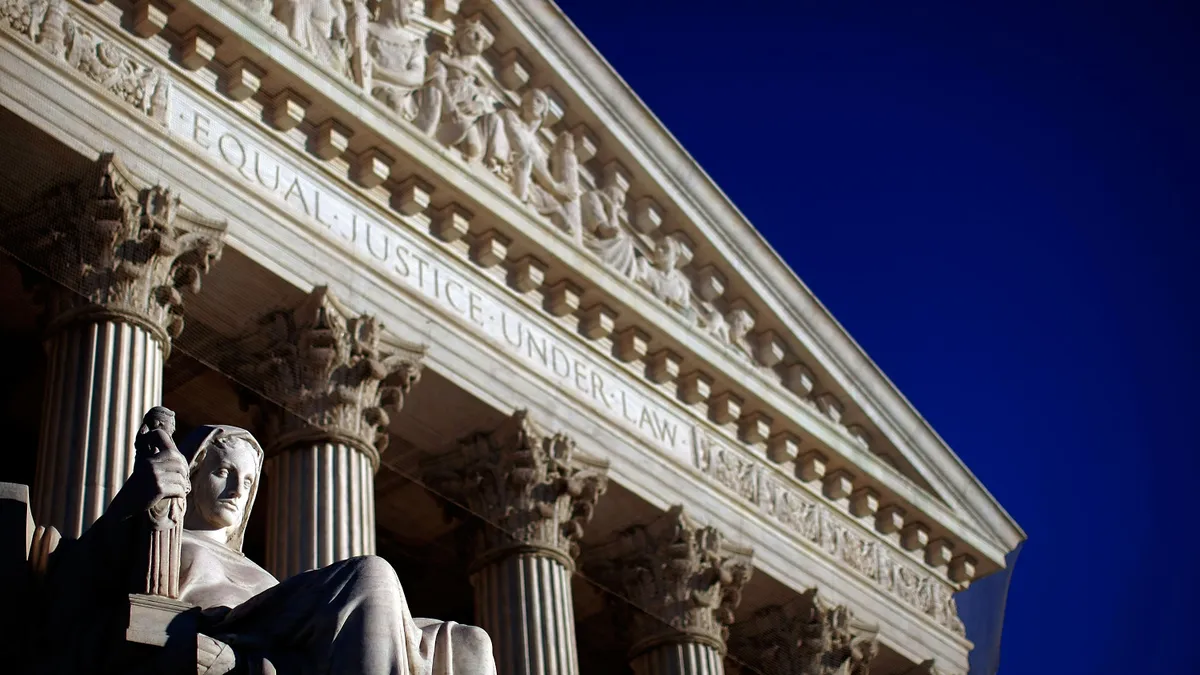Dive Brief:
- The U.S. Supreme Court on Monday agreed to hear arguments on whether colleges can use applicants' race in admissions decisions, again taking up the issue decades after first ruling on it.
- The court granted petitions to hear two cases brought by Students for Fair Admissions, an anti-affirmative action group led by legal strategist Edward Blum. It will consolidate the cases, which are against Harvard University and the University of North Carolina at Chapel Hill, meaning the case will cover both a private nonprofit and public institution.
- Experts have long been watching the two cases, which have wended their way through lower courts since 2014. The high court has upheld race-conscious admissions several times, recently in a 4-3 decision affirming limited use of race in admissions at the University of Texas in 2016. But turnover has resulted in a more conservative bench since then, leading to speculation justices are now more likely to rule against race-conscious admissions.
Dive Insight:
Defenders of race-conscious admissions practices say considering race as one factor among many in a holistic process makes student bodies more diverse and improves students' education. Critics allege they are discriminatory and violate the ideal that race should not help or harm anyone's chances in life.
Colleges' race-conscious admissions practices are built on a legal framework dating to Regents of the University of California v. Bakke, a 1978 Supreme Court decision that struck down racial quota systems but indicated race could be used in admissions decisions as one of several factors. The court notably upheld the narrowly tailored use of race in admissions in 2003 in another case, Grutter v. Bollinger.
Students for Fair Admissions is arguing Harvard's admissions process is biased against Asian Americans. It has argued UNC-Chapel Hill discriminates against White and Asian American applicants.
U.S. District Judge Allison D. Burroughs rejected the group's arguments against Harvard in a 2019 ruling in which she said the university's processes might be imperfect, but they pass constitutional muster. Burroughs found no evidence of prejudice against Asian Americans.
U.S. District Judge Loretta C. Biggs ruled for UNC-Chapel Hill in October, finding that UNC-Chapel Hill narrowly tailors its use of race in admissions. Students for Fair Admissions then appealed.
The Supreme Court agreed to hear the cases Monday over objections from the Biden administration, which urged justices not to take the "extraordinary step" of reevaluating its past decisions.
Harvard President Lawrence Bacow said in a statement that the Supreme Court's decision to hear the case "puts at risk 40 years of precedent." The university will defend its admissions practices, he said.
"Harvard does not discriminate; our practices are consistent with Supreme Court precedent; there is no persuasive, credible evidence warranting a different outcome," Bacow said. "The University remains committed to academic excellence, expanded opportunity, and diverse educational experiences — and to the perennial work of preparing students for fruitful careers and meaningful lives."
A UNC-Chapel Hill spokesperson said in a statement that the university is looking forward to defending its admissions program, saying it is "consistent with long-standing Supreme Court precedent and allows for an evaluation of each student in a deliberate and thoughtful way."
Blum, who is Students for Fair Admissions' president, called for the justices to end the use of race as an admissions factor at all colleges and universities.
"In a multi-racial, multi-ethnic nation like ours, the college admissions bar cannot be raised for some races and ethnic groups but lowered for others," he said. "Our nation cannot remedy past discrimination and racial preferences with new discrimination and different racial preferences."
Sherrilyn Ifill, president and director-counsel of the NAACP Legal Defense and Educational Fund, which has argued in court against Students for Fair Admissions' case, said in a statement that holistic, race-conscious admissions programs help lower systemic barriers to education for qualified Black students and other students of color. Ifill defended such programs, saying they ensure students and their experiences, "shaped and influenced by race," are considered for their possible contributions in educational settings.
"Further, the Court's decision today comes amidst the backdrop of widespread efforts to erase and deny the experiences of people of color," Ifill said. "As our country experiences a resurgence of white supremacy, it is as important now as ever before that our future leaders be educated in a learning environment that exposes them to the rich diversity that our country has to offer, so they may be fully prepared for the many challenges ahead."
Harvard and UNC-Chapel Hill followed Supreme Court precedent, and campuses everywhere should be given "a level of deference" to decide how to build their student bodies, said Peter McDonough, vice president and general counsel at the American Council on Education, a higher ed trade group.
"One of the things we celebrate is the variety of higher education institutions: large, small, public, private, religious, nonreligious," McDonough said. "Many of these institutions, Harvard and UNC among them, have formed a judgment that a diverse student body is not only just relevant but critical to their educational mission and the delivery of their programs. While these cases are about diversity and admissions, they're also about institutional autonomy at the higher ed level."















